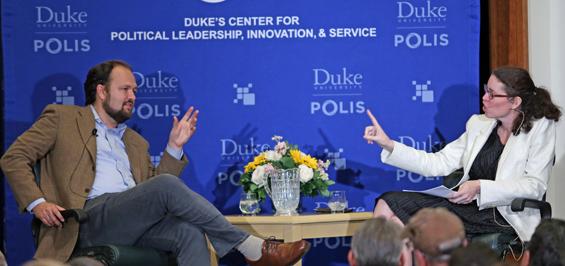
“What’s bad for conservatism, for Republicans and the nation is good for us,” Ross Douthat, a conservative columnist for The New York Times, said at the Sanford School on Wednesday night. He and Megan McArdle, a columnist for The Bloomberg View, discussed the state of the GOP and conservatism in the age of Trump.
As the Jack and Pamela Egan Visiting Professor this fall, McArdle is teaching a class in op-ed writing with the DeWitt Wallace Center. McArdle and Douthat were colleagues, having been part of what McArdle called “the first class of bloggers at The Atlantic.”
The election of President Donald Trump revealed deep divisions in the Republican Party. Both columnists put themselves in the “never Trump” camp of conservatives, who believe he is not qualified to be president.
The day before their talk, a wave of Democrats were elected in Virginia, winning the governorship and flipping at least 14 seats in the House.
“What this showed is that the laws of politics are not suspended. The Republicans lost the suburbs in a big way,” Douthat said. It was an expected result with an unpopular president in a midterm election.
McArdle pointed out that as pundits, it is tempting to over-read the historical parallels. Many people saw the election of Obama as 1932, when President Franklin Roosevelt was elected, expecting a new period of dominance by the Democratic Party.

She thought the Virginia results were explained by “the only aphorism I’ve created as a journalist that has legs: The devotees of the party in power are smug and arrogant. The devotees of the party out of power are insane."
In the upcoming elections, Douthat said a central factor will be how popular Trump is at the time. When Trump is quiet for a time, his approval level floats up. When Trump tweets or is quoted, it goes back down.
“Trump is more tolerable when people forget he’s president,” he said.
While under Obama, many conservatives felt threatened by the rapid pace of cultural change, now liberals feel threated.
“Trump is now the focus of the resistance,” said Douthat.
“In all of America, there was an idea of the public square, a sense that we could have a discussion,” McArdle said. That idea doesn’t seem as strong now, she said.
Their discussion turned to the current House bill on taxes. Both agreed the bill contains some good provisions, and closes loopholes that should be closed. McArdle wished more of the cuts were for lower income Americans and would narrow the deficit, instead of targeting upper middle-class elites.
“‘We hate you’ seems to be the major message of the tax code bill,” she said.
During a Q&A session at the end of their talk, they turned to judicial supervision of gerrymandering.
Douthat said in general he prefers “competitive gerrymandering as God intended” as the parties trade power, but he is sympathetic to the problems it poses.
An audience member asked whether either of them considered running for office.
Douthat admitted to considering it, but as he lives mostly in DC and Connecticut, and “neither is a good place for a Catholic, anti-Trump populist,” he concluded running for office was not practical.
As the daughter of a lobbyist, McArdle said she knows many politicians, and know what the role requires. When Jeb Bush was governor of Florida, she interviewed for a position of speechwriter.
“It was like being in the room with the sun; you can’t pay attention to anything else,” she said, adding that no one ever said that about her.
There are two ways to look at this dark moment in American politics, said Douthat. It is either a sign that we must work to get things back to normal as soon as possible, or “a sign of the need to widen our ideas of what can happen,” he said.
The event was hosted by the Sanford School of Public Policy, the DeWitt Wallace Center for Media and Democracy and POLIS, the Center for Political Leadership, Innovation, and Service.
